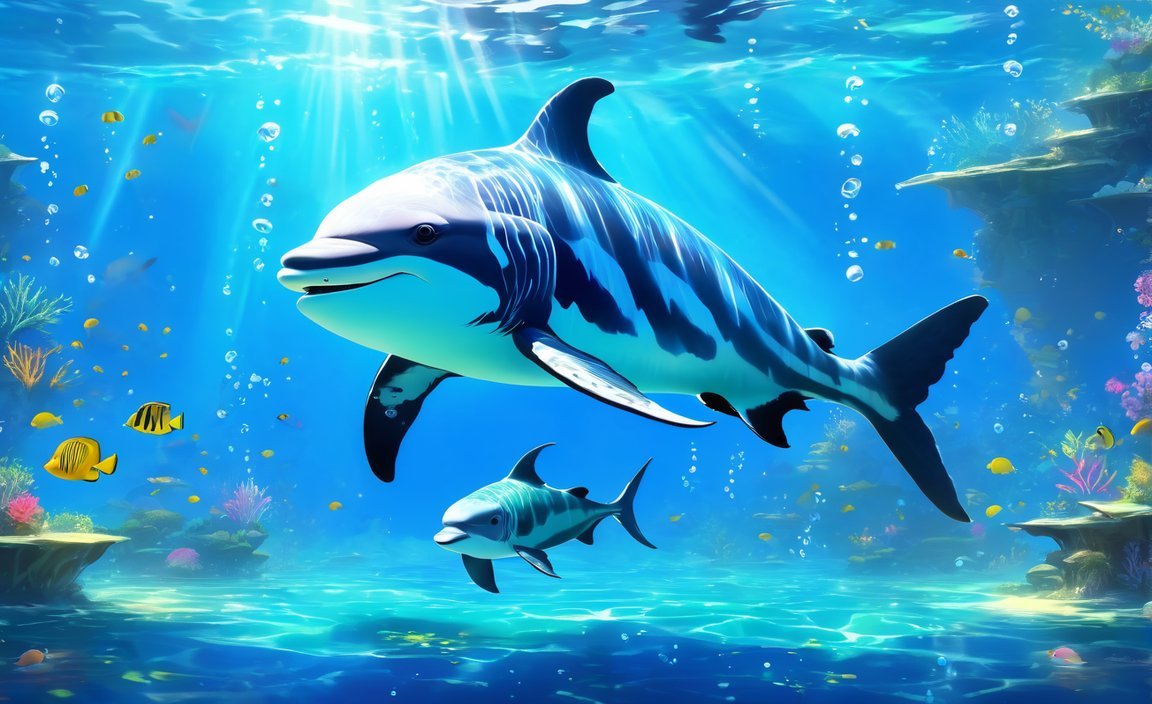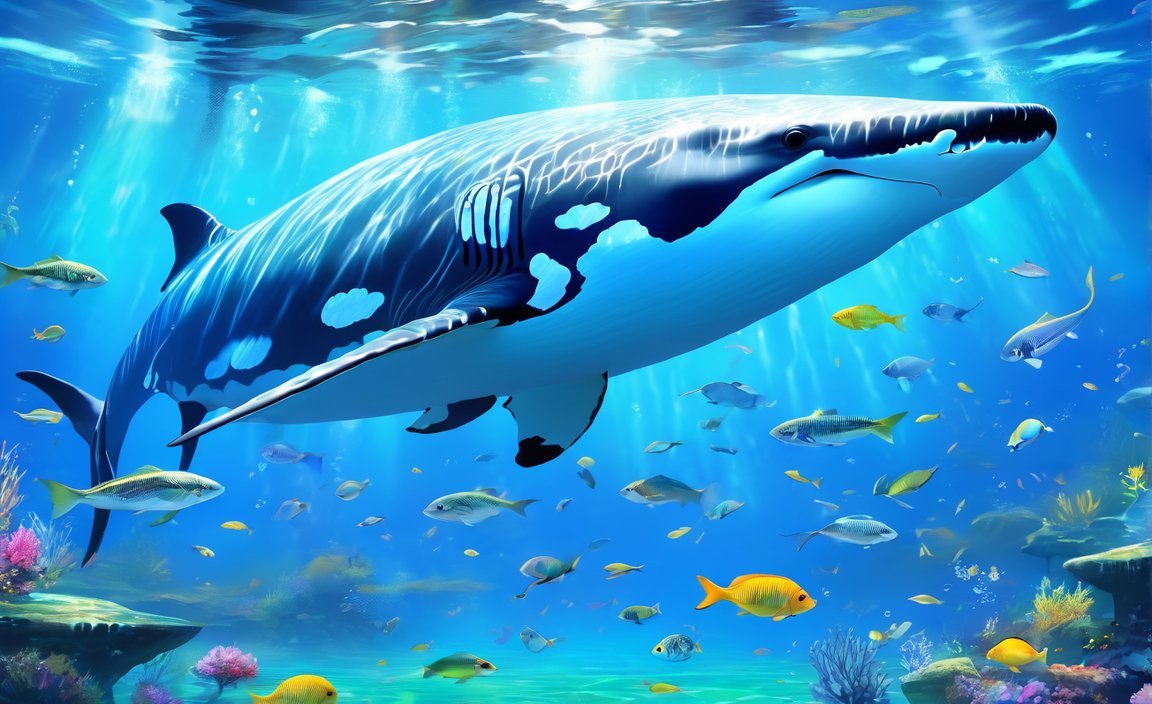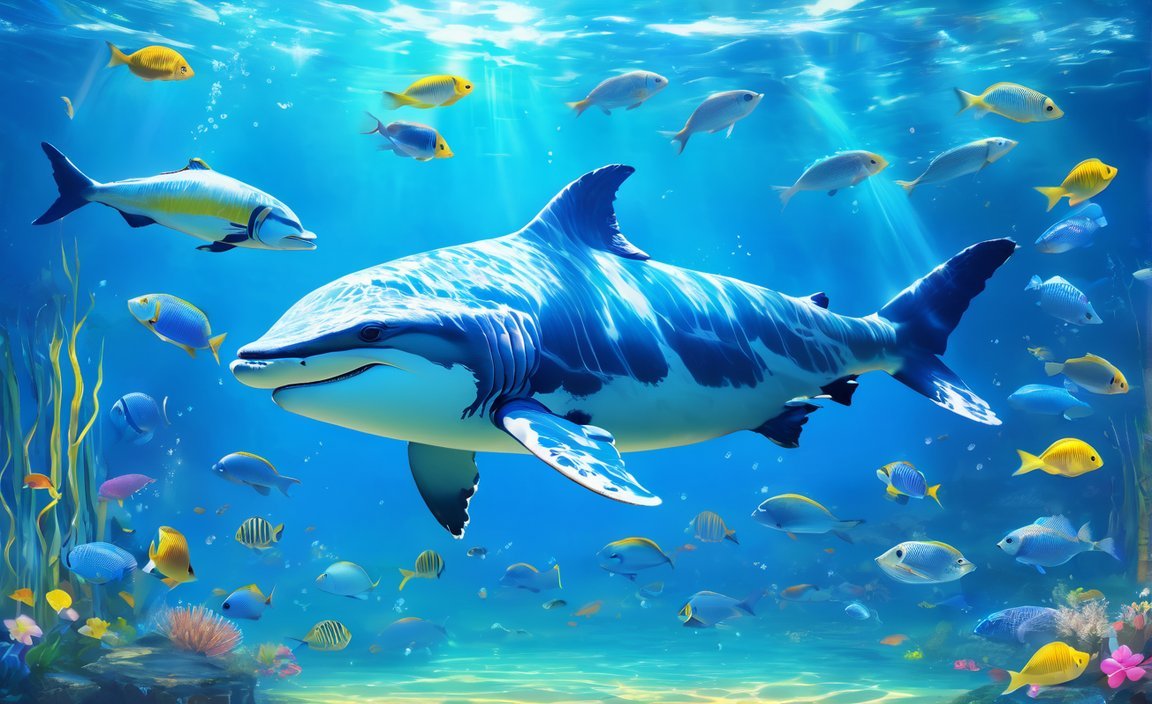Hey there, animal lovers! If you’re curious about the secret sauce that keeps animals alive and kicking, look no further than water. This magical liquid plays a huge role in their lives, from keeping them working like clockwork to helping them stay cool as cucumbers. In this article, we’ll explore 10 reasons why water is the MVP for our furry, feathered, and scaly friends. So, grab a tall glass for yourself and let’s dive into the water world of animals.

10 Importance of Water to Animals
We all know water is essential. It’s like the magic ingredient for everything on Earth, especially for our animal friends. But have you ever stopped to think about why it’s so important for them? Let’s dive into the incredible ways water keeps animals thriving:
- The Building Blocks of Life: Think of water as the foundation of an animal’s body. It makes up a whopping 50-66% of their weight! That’s because their cells, organs, and tissues are all bathed in this life-giving liquid. Animal bodies are made up of mostly water, so water is essential for their survival.
- Fueling the Engine: Just like cars need fuel, animals need water for their internal engines to run. It’s the key ingredient for breaking down food, absorbing nutrients, and converting them into energy. Without it, their bodies would simply grind to a halt.
- Staying Cool Under Pressure: Ever notice how dogs pant after a run? That’s water working its magic! Animals rely on water to regulate their body temperature. Whether it’s through sweating, panting, or even splashing around in a cool stream, water helps them beat the heat.
- Smooth Operators: Imagine trying to move without any lubrication in your joints – ouch! Water acts like a natural lubricant, ensuring smooth and comfortable movement for animals. It also cushions their organs, protecting them from bumps and jolts.
- Flushing Out the System: We all know the importance of staying hydrated to keep things moving, and it’s no different for animals! Water helps flush out waste products from their bodies through urine and feces, keeping them happy and healthy.
- A World of Life Underwater: From the tiniest plankton to the largest whales, water is the lifeblood of entire ecosystems. It provides a home, a source of food, and a way to get around for countless aquatic creatures.
- From Generation to Generation: Water plays a vital role in ensuring the survival of species. It’s a crucial component of reproductive fluids and helps nourish developing embryos. And let’s not forget about milk and eggs – two incredibly important sources of nutrition that depend heavily on water.
- A Veterinarian’s Best Friend: Ask any vet, and they’ll tell you that dehydration is a serious concern for animals. Just like in humans, it can lead to a whole host of health problems. That’s why access to clean, fresh water is paramount.
- A Precious Resource in a Thirsty World: In many parts of the world, water is scarce, and animals likely feel the impact most acutely. Droughts can devastate entire populations, highlighting the delicate balance between water availability and animal survival.
- Quality Matters: It’s not just about having water; it’s about having clean water. Pollution from human activities can contaminate water sources, posing serious threats to animal health and well-being.
The importance of water for animals can’t be overstated. It’s vital for their survival, from the smallest cellular processes to the vast ecosystems they inhabit. As we continue to learn more about the intricate ways animals interact with their environment, one thing remains clear: water is truly the elixir of life.
Water conservation is vital for the well-being of our community. Discover the 10 importance of water conservation in the community by clicking here.
Water plays a crucial role in crop growth. Learn about the 10 importance of water to crops by clicking here.
Plants rely on water for their survival. Find out the 10 importance of water to plants by clicking here.
Dive into the fascinating world of marine biology and explore 10 important facts by clicking here.
Attention veterans! Discover 10 important facts about your VA burial benefits by clicking here.

What are 10 functions of water relevant to the animal body?
We’ve already talked about how important water is for animals, but let’s really dive into the specifics! It’s pretty amazing how water is involved in so many different ways to keep an animal’s body running smoothly:
- Think of water as the ultimate mixer: Imagine trying to bake a cake without first mixing all the ingredients. That’s kind of what it’s like for our bodies without water. It acts as the crucial ingredient that allows all the chemical reactions to happen, like breaking down food for energy and getting rid of waste products.
- Staying cool under pressure: Ever wonder how animals, especially those furry friends, don’t overheat on a scorching day? Water is a bit like their built-in air conditioner. Its ability to absorb heat keeps their temperature stable, and when it evaporates from their skin, it creates a refreshing cooling effect.
- From food to fuel: Imagine trying to blend a smoothie without enough liquid—you’d end up with chunks! Water helps break down food into smaller, more manageable bits. Plus, it acts like a delivery service, dissolving nutrients so they can be easily absorbed into the bloodstream – think of it like tiny boats carrying essential cargo throughout the body.
- Flushing away the yucky stuff: Nobody likes dealing with trash, right? Water helps our bodies get rid of waste products efficiently, kind of like a plumbing system. It dissolves those unwanted substances and helps flush them out through urine and feces.
- The balancing act: Just like we need the right balance of ingredients for a perfect recipe, our bodies need a delicate balance of fluids. Water is the key to maintaining that equilibrium, ensuring our cells function correctly and keeping our blood pressure in check.
- Nurturing new life: Water is essential for the miracle of life. It provides a protective and nourishing environment for embryos to grow and develop, and it’s a major component of milk, giving newborns the hydration and nutrients they need to thrive.
- Supercharging those eggs: For animals that lay eggs, water plays a vital role in ensuring the eggs are healthy and ready for the next generation. It’s chock-full of essential nutrients and helps keep those developing embryos hydrated.
- A world of possibilities: Think about all the incredible creatures that call water their home! From tiny fish to gigantic whales, water provides a habitat, a source of food, and a place to mate and raise their young.
- The mysteries of water: While we know a lot about water, scientists are still uncovering its hidden depths! For instance, they’re studying how the quality of water affects animals’ health and if pollution might impact their well-being. They’re also fascinated by how animals find water and how its availability influences where different species live.
- Using water wisely: Since water is so precious, researchers are constantly exploring new ways to use it more efficiently, especially in animal farming. This includes developing innovative techniques and technologies that reduce water waste and minimize the impact on the environment.
The study of water and its role in the animal kingdom is an ongoing journey, and we can expect to learn even more fascinating facts in the years to come. It’s a reminder that something so seemingly simple is actually incredibly complex and vital for all life on Earth.
What is the importance of water for animals?
We’ve already talked about how important water is, but let’s dive a little deeper into just how much animals rely on it. Think of it this way: water isn’t just something they drink; it’s a fundamental part of who they are. A huge chunk of their body weight is actually water, and it’s the stuff that holds their cells, tissues, and organs together.
But it’s more than just building material. Imagine a bustling city – that’s what’s happening inside an animal’s body, and water is the main transportation system. It carries nutrients to different parts of the body, helps create energy, and even takes out the trash (we’re talking waste removal here).
Ever notice how your dog pants after a run on a hot day? That’s water working its magic! Water helps animals regulate their internal temperature. When things heat up, they sweat or pant, and the water evaporating helps them cool down. This ability to absorb heat without going through drastic temperature swings is one of water’s superpowers.
And when it comes to raising a family, well, water is essential for that too. It creates a safe space for embryos to develop and is a key ingredient in milk and eggs, giving babies the nourishment they need. Basically, without water, there wouldn’t be any baby animals, and that would make the world a much less lively place!
Scientists are constantly learning more about the intricate ways animals use water, and some of the findings are pretty amazing. For instance, did you know that some desert animals can actually get most of the water they need from the foods they eat? It just goes to show that when it comes to water and animals, there’s always something new to discover!
What are 4 reasons animals need water?
We already know that water is super important for life, but let’s dive into why animals need it so much. It’s not just about feeling thirsty – water plays a vital role in keeping their whole system running!
- Staying Cool: Imagine wearing a fur coat on a sunny day – you’d get pretty hot! Animals can overheat too, especially those with thick fur. Sweating and panting might seem kinda gross, but it’s how they use water to cool down. Think of it like their own built-in air conditioning! The water evaporates from their skin or when they breathe out, carrying away heat and helping them maintain a comfy body temperature.
- Tummy Troubles: Ever try to swallow a mouthful of dry crackers? It’s tough! Water helps break down food in their stomachs, making it easier to digest and absorb all those important nutrients. It’s like how water helps make dough – it mixes everything up and gets things moving along smoothly through their digestive system.
- Flushing Out the Bad Stuff: Just like we go to the bathroom, animals need to get rid of waste products from their bodies too. Water helps dissolve those waste products so they can be flushed out more easily. It’s like taking out the trash – gotta keep things clean inside!
- Delivery System: Imagine trying to send a package without a delivery truck! Water is like the delivery system for animals’ bodies. It makes up most of their blood, which carries essential nutrients and oxygen to every single cell. This ensures that all their cells have the fuel they need to function properly.
Think about it: Water is essential for pretty much every important function in an animal’s body. From regulating temperature to delivering nutrients, it’s clear that water is much more than just a refreshing drink for animals – it’s fundamental for their survival!
How do animals need water?
We all know that water is essential for life, and that goes for every creature on Earth, not just us humans! But have you ever stopped to think about why animals need water so much? It’s more than just quenching their thirst on a hot day. Water is like the behind-the-scenes hero, playing a vital role in keeping their bodies running smoothly.
Think of it this way: water makes up a huge chunk of an animal’s body weight. Some animals are practically swimming on the inside, with their bodies made up of almost 90% water! This precious liquid acts like a transportation system, delivering nutrients to cells and carrying away waste products.
But that’s not all. Water is a bit of a multitasker. It’s like the ultimate regulator, helping animals maintain a steady and comfortable body temperature. When it’s scorching outside, water helps them cool down through sweating or panting. And when it’s chilly, it acts like insulation, preventing them from losing too much heat.
Let’s talk about how animals actually get their H2O. Some animals, like us, drink water directly from rivers, lakes, or puddles. Others, especially those living in dry environments, have developed some pretty ingenious methods. Some animals, like desert dwellers, extract moisture from the foods they eat, like juicy plants or even their prey. And then there are those clever insects that can actually pull water out of thin air, collecting morning dew or condensation.
Scientists are always learning more about how animals have adapted to survive in different environments, and water plays a huge role in that story. The availability of water can have a big impact on where animals can live and how well they thrive. So, the next time you take a sip of water, remember that you’re not alone in relying on this incredible liquid. It’s the lifeblood of the animal kingdom!
What are 10 functions of water for the body?
We already know that staying hydrated is super important, but did you ever stop to think about all the amazing things water does for our bodies? It’s honestly pretty incredible! It’s like the behind-the-scenes hero keeping everything running smoothly.
So, let’s dive in and explore ten remarkable ways water works its magic:
- Keeps You Cool: Ever wonder how our bodies stay cool even when it’s scorching outside? Water’s got a knack for absorbing heat, acting like a built-in cooling system. It soaks up extra heat and then slowly releases it, preventing us from overheating.
- The Ultimate Balancer: Imagine a delicate balancing act inside your body – that’s what water helps manage. It dissolves all sorts of important stuff, ensuring everything stays at the right pH level. Think of pH like a recipe – if it’s off, things can go haywire. Water keeps those ingredients in check!
- Delivery Service Extraordinaire: Think of water as the delivery driver for all the good stuff your body needs. It carries nutrients – vitamins, minerals, you name it – to every single cell, ensuring they have the fuel to keep going.
- Waste Management Expert: Our bodies are constantly producing waste, which isn’t exactly glamorous. Thankfully, water steps in to flush it all out. Whether it’s through sweat, urine, or other means, water helps eliminate toxins, keeping us healthy and functioning properly.
- Smooth Operator: Our joints are like well-oiled machines, thanks to water’s lubricating prowess. It prevents friction, allowing us to move freely and without pain. Imagine trying to bend your elbows or knees without it – ouch!
- Energy Booster: Remember those energy drinks promising a boost? Well, water plays a starring role in our natural energy production. It’s involved in breaking down food into smaller, more usable bits and participates in cellular respiration – the process that generates energy within our cells.
- Digestive Dynamo: Ever notice how a big meal can leave you feeling sluggish? Water aids in digestion, breaking down food into smaller components and helping our bodies absorb all the good stuff. It keeps things moving and prevents digestive discomfort.
- Metabolic Mastermind: “Metabolism” might sound like a fancy word, but it’s basically the sum of all the chemical processes happening in our bodies. Water is a key player in many of these processes, from energy metabolism to protein synthesis – essentially, it keeps our internal engine running.
- Cellular Superstar: Our cells are like tiny factories, and guess what? They’re mostly made of water! It helps maintain their structure and ensures they function properly. Water is like the foundation upon which our cells thrive.
- Life-Giving Force: Reproduction – the miracle of life – wouldn’t be possible without water. It provides the perfect environment for embryos to develop and nourish themselves, and it’s even essential for milk production in mammals.
So there you have it – ten amazing functions of water that we often take for granted. It’s truly incredible how this simple molecule plays such diverse and vital roles in keeping us alive and thriving!
What are the 7 functions of water in living organisms?
We’ve already talked about how crucial water is for life – it’s like the behind-the-scenes hero in the story of every living thing. But let’s dive a little deeper into just how water pulls off all these amazing feats. Think of it like this: water isn’t just hanging out in our bodies; it’s actively participating in a million tiny tasks every second.
1. The Ultimate Dissolver: Water as a Solvent
Imagine trying to make a cake without first mixing the ingredients. That’s kind of what it would be like for our bodies to function without water. Water acts as a fantastic solvent, meaning it can dissolve a bunch of different substances. This is super important because it allows nutrients, minerals, and all sorts of essential stuff to travel around our bodies. Without water, these vital components would just be sitting there, unable to reach where they’re needed.
2. Holding Us Together: Water as a Structural Support
Ever wondered how our cells maintain their shape? It’s like they have an internal scaffolding, and guess what? Water is a key component! Water provides this internal pressure that helps cells maintain their form and prevents them from collapsing. This is especially important for plants, giving them the rigidity to stand tall and reach for the sunlight.
3. The Chemical Matchmaker: Water’s Role in Reactions
Think of water as the host of a giant chemical party happening inside of us every second. Water plays a crucial role in facilitating chemical reactions. It helps transport ions (electrically charged atoms) to the right places, allowing these reactions to occur. Without water, these reactions would slow down or even come to a grinding halt, throwing the entire system out of whack.
4. The Temperature Controller: Water and Thermoregulation
We all know how important it is to maintain a stable body temperature. Water is the MVP of thermoregulation. Because water is incredibly good at absorbing and releasing heat, it helps us stay comfortable whether it’s a scorching summer day or a chilly winter night. Think of it like a built-in thermostat, keeping our internal environment just right.
5. Keeping Things Moving Smoothly: Water as a Lubricant
Imagine the friction if our joints weren’t lubricated! Ouch, right? Water acts as a natural lubricant, reducing friction between bones, muscles, and organs. This allows for smooth movement and prevents wear and tear on our bodies.
6. Taking Out the Trash: Water and Waste Removal
Our bodies are constantly producing waste products that need to be eliminated. Water plays a key role in flushing out these toxins through urine and feces, keeping our systems clean and functioning properly.
7. Cellular Travel: Water’s Role in Cell Movement
Water is crucial for processes like osmosis and turgor pressure, which are essential for cell movement and nutrient transport. In simple terms, water helps cells maintain just the right amount of internal pressure to function properly. It’s like a delicate balancing act that keeps everything running smoothly.
This is just a glimpse into the amazing world of water and its roles in living organisms. Scientists are constantly discovering more about this incredible substance, and there’s still so much to learn! The next time you take a sip of water, take a moment to appreciate the incredible journey it’s about to take through your body.
What is the role of water in our body Class 10?
Okay, so we already know water is super important for pretty much everything, right? But have you ever thought about why it’s so essential for our bodies? Like, what does it actually do in there? Let’s dive in and explore the fascinating ways water keeps us going!
First things first, did you know that roughly 50-70% of your body is just water? That’s like, more than half of you! It’s the main ingredient in our cells, the building blocks of our organs, and basically all our tissues. Think of it like this: if our bodies were houses, water would be the bricks, the mortar, everything! And just like a house needs those materials to stand strong, our bodies need water for tons of important jobs.
One of the biggest things water does is act like our personal, internal thermostat. When we start to get overheated – maybe from exercising or just being out in the sun – water steps in and absorbs the extra heat. This keeps our temperature from getting dangerously high. It’s especially vital for animals living in hot places, where staying cool is crucial for survival. And get this: when it’s cold out, water can actually do the opposite! It releases the heat it stored earlier, helping us warm up. How cool is that?
Now, let’s talk digestion. You know how we need to break down all the food we eat to get the good stuff out of it, right? Well, water is key for that too. It helps dissolve food and makes it easier for our bodies to absorb nutrients. Imagine trying to make soup without any liquid – it just wouldn’t work! Water is like the broth of our digestive system, making sure everything runs smoothly.
And here’s something you might not have thought about: water is like our internal cleaning crew. It flushes out all the waste and toxins our bodies produce, kind of like a garbage disposal. Without water, that stuff would just build up inside us, which wouldn’t be good at all!
But wait, there’s more! Water also plays a critical role in all those chemical reactions happening inside us every second. It’s like the stage where all the important molecular “actors” come together to do their thing. These reactions are what keep us alive and functioning, and they simply can’t happen without water.
To sum it all up:
- Water makes up a huge part of our bodies – more than half!
- It keeps our temperature stable, acting like an internal thermostat.
- Water helps us digest food and absorb all the good stuff.
- It acts like our internal cleaning system, removing waste products.
- And maybe most importantly, water is essential for all those chemical reactions that keep us alive and kicking!
Want to learn more?
Scientists are still uncovering all the amazing things water does in our bodies. It’s a fascinating area of research! Here’s a link to learn more: The Importance of Water for Animals
What is the function of water in the animal cell?
Picking up from where we left off, let’s dive deeper into how water works its magic inside animal cells. We’ve talked about how it helps regulate temperature and transport stuff throughout the body, but its role within each tiny cell is just as crucial.
Imagine a bustling city – that’s your average animal cell! Water acts like the main transportation system, ferrying important nutrients to different parts of the cell and carrying away waste products. Without water, this intricate system would grind to a halt, and the cell wouldn’t be able to function.
But water’s role goes beyond just being a delivery service. Remember how we talked about water being involved in almost every chemical reaction in the body? Well, this is especially true inside the cell. These reactions, essential for the cell’s survival and growth, often happen in a watery solution. Think of water as the facilitator, helping these reactions happen smoothly and efficiently.
Here’s another cool thing: water plays a part in maintaining the cell’s shape. Just like a balloon needs air to hold its form, cells rely on the right amount of water pressure to keep their structure. This is super important because a cell’s shape often dictates its function.
Scientists are constantly researching how water behaves within the cell, and new discoveries are always on the horizon. Some studies suggest that water might even play a role in how cells communicate with each other! This research is pretty complex, but it highlights how much we still have to uncover about the humble water molecule.
Here’s a quick recap of water’s functions inside the animal cell:
| Function | Explanation |
|---|---|
| Transportation | Acts like a delivery system, moving nutrients in and waste products out. |
| Reaction Medium | Provides the environment for essential chemical reactions to occur. |
| Shape Maintenance | Helps maintain the cell’s structure through internal pressure. |
| Potential Communication | Some research suggests water might be involved in how cells “talk” to each other, but more research is needed. |
It’s amazing how something so seemingly simple as water can be so critical to the very building blocks of life. As we continue to learn more about its role in the animal cell, we’re likely to uncover even more fascinating secrets about this essential molecule.
What are the functions of aquatic animals?
We’ve already talked about how awesome and diverse aquatic animals are, but have you ever thought about what they actually do in their watery homes? Turns out, these finned, scaled, and shelled creatures are way more important than just being pretty to look at. They’re like the behind-the-scenes crew of the underwater world, keeping everything running smoothly.
One of their biggest jobs is being part of the aquatic food chain. Just like on land, some animals are eaters, and some, well, get eaten. Think of it like a giant underwater buffet! Tiny aquatic animals, like zooplankton, munch on microscopic plants called phytoplankton. Then, slightly bigger animals gobble them up, and so on. This chain reaction of eating and being eaten helps transfer energy from the bottom of the food chain all the way to the top predators like sharks and whales.
But it’s not just about filling their bellies. This whole process, called nutrient cycling, is how important nutrients get moved around the ecosystem. When animals eat, they absorb nutrients, and when they, let’s say, “deposit” waste, those nutrients go back into the water, acting like fertilizer for underwater plants. It’s a bit gross, but hey, it’s nature’s way of recycling!
Now, let’s talk about water quality. We all like our water clean, right? Well, thank an aquatic animal today! Many of them are like little living filters. Take mussels and clams, for example. These guys are filter feeders, meaning they suck in water, eat the tiny particles and pollutants floating around, and then spit out the clean water. It’s like having a million tiny water purifiers working 24/7!
And don’t forget about the decomposers – the cleanup crew of the aquatic world. These creatures, like bacteria and some types of worms, break down dead plants and animals. While it might not sound glamorous, it’s super important for keeping the ecosystem healthy. Decomposition releases even more nutrients back into the water, providing food for plants and kickstarting the whole cycle all over again.
Scientists often look at the health and number of aquatic animals in an area to get a sense of how the entire ecosystem is doing. Lots of different species usually mean the water is clean and the habitat is thriving. But if those numbers start to drop, it can be a warning sign that something is wrong – kind of like a canary in a coal mine.
There’s still so much we are learning about aquatic animals and the roles they play in their environments. New discoveries are being made all the time, which is pretty exciting! But one thing’s for sure – these creatures are essential for healthy oceans, lakes, and rivers. Protecting them and their habitats is crucial not just for the balance of nature, but for our own well-being too. After all, we’re all connected, right?
What are the five functions of water biology?
So, we’ve been talking about how important water is to life, and believe me, it really is a big deal. Let’s dive into some specific ways water keeps things running smoothly in the world of biology.
- The Ultimate Dissolver: Think of water as kind of like a universal mixer. Its chemical makeup allows it to break down and dissolve a huge range of substances. From the nutrients your body needs to the waste it gets rid of, water helps get those things where they need to go.
- Propping Things Up: Ever notice how a plant wilts without water? That’s because water helps give cells and tissues their shape. It’s like an internal scaffolding. In plants, this keeps them upright and helps them move nutrients around.
- The Temperature Controller: You know how a pool feels refreshingly cool on a hot day? Water is great at absorbing and releasing heat without wild temperature swings. This is super important because living things need to stay within a certain temperature range to function.
- The Delivery System: Imagine a network of waterways, delivering important goods. That’s kind of what water does inside living things. It acts like a transportation system, carrying nutrients, hormones, and even waste products through the body.
- The Reaction Facilitator: Water isn’t just a passive bystander in your body – it’s an active participant! It plays a key role in tons of chemical reactions that are essential for things like energy production, processing nutrients, and getting rid of waste.
Things to Keep in Mind
- Scientists are always learning more about the complex role water plays in biology. What we know today is likely to evolve as research continues.
- This is just a snapshot of the amazing things water does. Exploring each of these functions further will reveal even more about its importance to life.
- SYBAU See You Baby Meaning: Gen Z Slang Evolves - July 1, 2025
- Unlock Your Inner Youth: Lifestyle Secrets for a Vibrant Life - July 1, 2025
- Decode SYBAU Meaning: Gen Z Slang Explained - July 1, 2025






